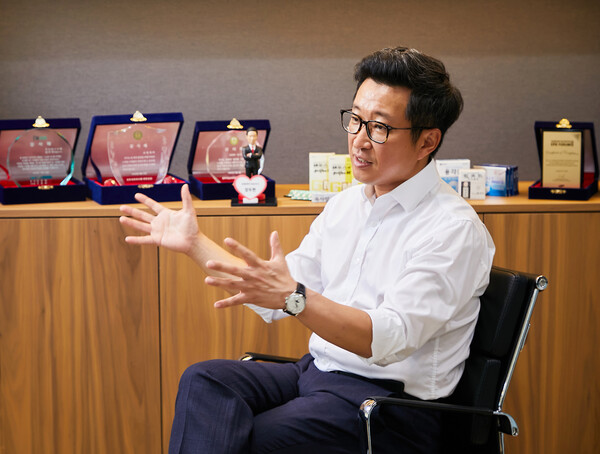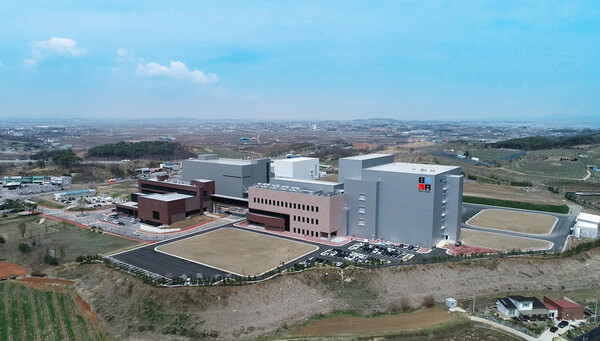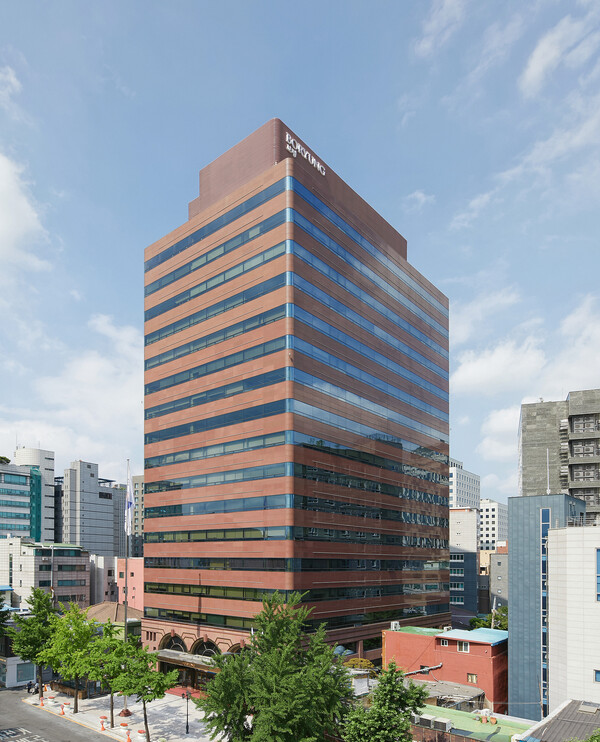After posting strong growth last year, Boryung aims to continue its momentum this year and join the “Trillion Won Club.” The company's confidence is fueled by increased sales across all business areas and success in the anticancer area.

Boryung CEO Chang Doo-hyun (Daniel Chang) recently met with reporters covering the Korea Pharmaceutical and Bio-Pharma Manufacturers Association (KPBMA) to discuss last year's performance and plans for this year. Last year, Boryung recorded 859.6 billion won ($642.3 million) in sales and 68.3 billion in operating profit, up 13 percent and 20.6 percent from 2022.
"Last year's performance was good, thanks to our customers' help and our employees' efforts," Chang said. "This year, we are expecting sales of 150 billion to 180 billion won for K-CAB, which is co-marketed with HK inno.N and Kanarb, our main product. Based on this, we expect to achieve 1 trillion won in sales this year. If we reach 1 trillion won (in sales) this year, it will reaffirm Boryung's sales and distribution capabilities."
Chang expressed his intention to solidify the company's leadership further, especially in the anticancer market.
According to IQVIA’s data, the prescription volume of anticancer drugs in Korea was 3 trillion won in the year from the fourth quarter of 2022 to the third quarter of 2023, and 76.4 percent of it was met with products from multinational pharmaceutical companies, with Korean companies filling the other 23.6 percent of demand. Boryung was the only Korean company among the top 10 companies in terms of prescription value of anticancer drugs by being ranked fourth, with 247.8 billion won.
"Boryung is striving to secure optimal treatment conditions for cancer patients through developing K-Generic anticancer drugs," Chang said. "Anticancer drugs highly depend on foreign products, and there are always concerns about supply and demand instability. However, Boryung has accomplished the ‘No. 1 market share of anticancer drugs among Korean pharmaceutical companies’ based on its competitiveness in anticancer drugs. Now is the time for us to move beyond business performance and focus more on stably providing patients with anticancer drugs with excellent quality and affordable prices."
As CEO Chang pointed out, anticancer drugs are a typical area marked by unstable supply and demand due to high overseas dependence. According to the Ministry of Food and Drug Safety, 252 drug supply interruptions and 176 drug shortages were reported in Korea from 2022 to June last year. In particular, some essential anticancer drugs are in short supply, causing cancer patients to postpone their treatment schedules or treat them with substitute drugs, leading to growing dissatisfaction and anxiety among patients.
Why does Boryung make anticancer drugs despite low profitability?
Anticancer drugs have a strong prescribing preference for original drugs. New drugs and generics are often difficult to develop, making companies produce and import these drugs. That also explains why supply remains unstable. However, generic anticancer drugs are more challenging than typical bioequivalence (or chemotactic equivalence) tests because they are targeted at cancer patients with urgent treatment needs and sensitive drug responses. There are also many additional considerations, such as recruiting patients for the test drug and establishing safety endpoints. The development of generic anticancer drugs is not easy. In addition, specialized manufacturing facilities and skilled manpower are required to produce anticancer drugs.
The problem is that basic anticancer drugs are priced as low as 1,000 won under the Korean drug pricing system so that few Korean pharmaceutical companies can compete on cost. This shows why only a few companies make anticancer drugs even though they are prerequisites for patients.
In this respect, Boryung's anticancer strategy is differentiated from other Korean pharma and biotech companies focusing on developing one or two biologics.
Boryung currently produces more than 30 products ranging from basic anticancer drugs to anticancer supplements. Among them, Epirubicin Hydrochloride Injection (epirubicin), EPS Injection (etoposide), and A.D. Mycin Injection (doxorubicin) are products with a cost-of-sales ratio of over 100 percent.
"Despite such a cost structure, Boryung is focused on stably supplying essential anticancer drugs for which there is no substitute while maintaining the value of 'patient first,'" Chang said. "We also focus on localizing anticancer drugs by continuously launching our products. In the mid- to long-term, we plan to develop a pipeline of generic and reformulated drugs for various cancer types, including digestive, lung, female, hematologic, and urinary cancers."
Last year, Boryung improved the formulation of its anticancer drug Gemza (gemcitabine) from a powder to a liquid. The existing product was in powder form and needed to be diluted, while the liquid liquor was ready to use, improving convenience. Boryung also launched Dtaxel, the first alcohol-free docetaxel liquid anticancer drug in Korea. The advantage of this product is that it can reduce symptoms caused by alcohol by replacing ethanol, an additive in existing docetaxel products, with other additives. It is also the first alcohol-free product among liquid docetaxel products in Korea.

What’s the secret behind tripling the anticancer business in four years?
Boryung's growth in the anticancer field can be attributed to its differentiated strategy.
Boryung started operating the “Anticancer Drug Team” in 2007 and gradually expanded the organization into the “Onco Headquarters” in 2019 and the “Onco Division” in 2020. Currently, Boryung is the only Korean pharmaceutical company that operates an oncology organization at the division level, the largest scale in the company. In addition, in 2021, the company established the only specialized blood cancer group in Korea, and in January this year, it established a lung cancer team, creating separate organizations with expertise and experience in each cancer type.
Boryung has established itself as a strong player in the anticancer market with a diverse portfolio of anticancer products ranging from synthetic drugs to biosimilars and adjuvant therapies, along with specialized organizations and personnel. As a result, Boryung's anticancer business has grown strongly every year, nearly tripling in four years, from 79.8 billion won in sales in 2019 to 217 billion won in 2023.
"Through the Legacy Brands Acquisition (LBA) strategy, we have secured a stable supply of global high-frequency anticancer drugs, as well as sales and profitability, by assetizing and internalizing them," Chang said.
LBA is a strategy of acquiring original drugs to maintain a high market share even after patent expiration. Boryung has acquired anticancer drugs Gemza (gemcitabine) and Alimta (pemetrexed) from global pharmaceutical companies and converted them into its products. It plans to continue reviewing the acquisition of various original items leading the therapeutic market.
From a generic anticancer drug maker to a new anticancer drug powerhouse

CEO Chang is confident that other domestic pharmaceutical companies will not be able to overcome Boryung's success in the anticancer drug market easily.
"It is difficult to build or maintain an anticancer drug facility without the will and investment to produce anticancer drugs, as it requires a separate specialized facility to produce anticancer drugs, and there are considerable difficulties in retaining and utilizing manpower, such as the inconvenience that workers on the production line must wear protective equipment to produce anticancer drugs, which are toxic substances," Chang said, pointing out that building an anticancer drug manufacturing facility is not easy.
Boryung has world-class anticancer drug manufacturing facilities and experts to mass produce and supply anticancer drugs stably. Boryung's cytotoxic anticancer injectable production facility, completed in 2019, is equipped with the latest “Isolator System” at most stages of the manufacturing process to produce even highly pharmacologically active drugs safely.
“Such a production facility is difficult to build quickly," he stressed.
In addition to stabilizing the supply of existing anticancer drugs, Chang said the company is also accelerating the development of new drugs for rare cancers for which there are no adequate treatments, expressing hope that the results will be seen in earnest this year.
Boryung is developing “BR101801” (BR2002 in the project name ). BR101801 is a first-in-class drug that triple inhibits PI3K gamma (γ), PI3K delta (δ), and DNA-PK, major growth regulators of cancer cells. BR101801 is being developed to treat peripheral T-cell lymphoma (PTCL). It has confirmed efficacy in six of the 19 patients in the phase 1 efficacy trial, including two complete and one partial response in the recently completed phase 1b study and results from the phase 1a study completed in 2021 (one complete remission and two partial responses).
Last December, Boryung presented phase 1 results at the American Society of Hematology, the world's largest meeting for blood cancers. The excellent clinical outcomes in patients with PTCL who have failed or relapsed after at least one prior treatment with other therapies, including standard of care, are expected to provide a new treatment option for PTCL in the future.
BR101801 received orphan drug designation from the U.S. Food and Drug Administration (FDA) in October 2022 and development-stage orphan drug designation from the Ministry of Food and Drug Safety (MFDS) last August. The orphan drug designation allows for conditional approval, which allows for an early launch after completion of phase 2. Boryung plans to complete the Phase 1 final results report in the first quarter of this year and apply for Phase 2 within the year.
"Boryung has been striving to localize multi-frequency essential anticancer drugs based on its leadership as 'No. 1 in the domestic anticancer drug market share,'" Chang said. "We will continue to develop and supply K-cancer drugs to provide optimal treatment conditions for cancer patients and do our best to establish anticancer drug sovereignty."
Related articles
- Boryung ties up with Baxter to expand anesthesiology business
- Boryung, HK inno.N to co-market their flagship hypertension and GERD drugs
- Boryung and MirimGENE to co-develop innovative new drugs
- Vivozon Group teams up with Boryung to commercialize non-narcotic painkiller in Korea
- KPBMA head named to chair Korea's healthcare reform panel

